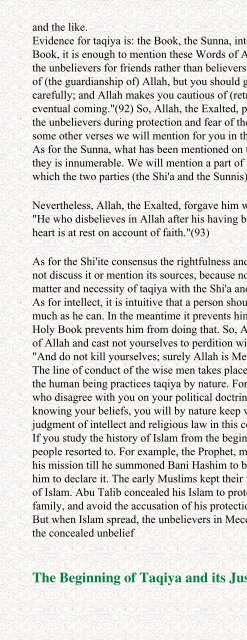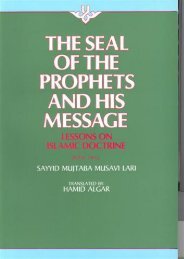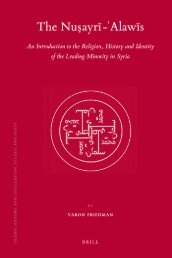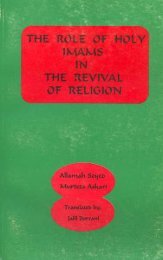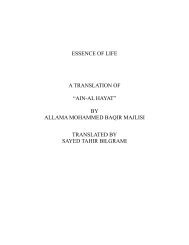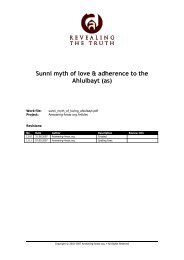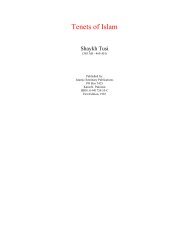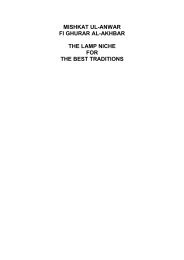Imam Al-Sadiq
Imam al-Sadiq - UMAA | Library
Imam al-Sadiq - UMAA | Library
- No tags were found...
Create successful ePaper yourself
Turn your PDF publications into a flip-book with our unique Google optimized e-Paper software.
and the like.<br />
Evidence for taqiya is: the Book, the Sunna, intellect, and the Shi'ite consensus. As for the<br />
Book, it is enough to mention these Words of <strong>Al</strong>lah, the Exalted,: "Let not the believers take<br />
the unbelievers for friends rather than believers; and whoever does this, he shall have nothing<br />
of (the guardianship of) <strong>Al</strong>lah, but you should guard yourselves against them, guarding<br />
carefully; and <strong>Al</strong>lah makes you cautious of (retribution from) Himself; and to <strong>Al</strong>lah is the<br />
eventual coming."(92) So, <strong>Al</strong>lah, the Exalted, permits the believers to pretend to be friends of<br />
the unbelievers during protection and fear of their evil (deeds), apart from this verse, there are<br />
some other verses we will mention for you in the following pages.<br />
As for the Sunna, what has been mentioned on the authority of ahl al Bayt, and other than<br />
they is innumerable. We will mention a part of it within this chapter. It is enough of the Sunna<br />
which the two parties (the Shi'a and the Sunnis) have reported about 'Ammar.<br />
Nevertheless, <strong>Al</strong>lah, the Exalted, forgave him when He sent down this verse concerning him:<br />
"He who disbelieves in <strong>Al</strong>lah after his having believed, not he who is compelled while his<br />
heart is at rest on account of faith."(93)<br />
As for the Shi'ite consensus the rightfulness and necessity of taqiya is very clear. So we will<br />
not discuss it or mention its sources, because no two persons differ in opinion about the<br />
matter and necessity of taqiya with the Shi'a and their followers.<br />
As for intellect, it is intuitive that a person should protect himself and his valuable things as<br />
much as he can. In the meantime it prevents him from casting himself to perdition. <strong>Al</strong>so, the<br />
Holy Book prevents him from doing that. So, <strong>Al</strong>lah, the Exalted, said: "And spend in the way<br />
of <strong>Al</strong>lah and cast not yourselves to perdition with your own hands."(94)<br />
"And do not kill yourselves; surely <strong>Al</strong>lah is Merciful to you."(95)<br />
The line of conduct of the wise men takes place according to this rational judgment. Rather,<br />
the human being practices taqiya by nature. For example, if you halt at the house of people<br />
who disagree with you on your political doctrine and principle and you are afraid of them<br />
knowing your beliefs, you will by nature keep what you have a secret without knowing the<br />
judgment of intellect and religious law in this connection.<br />
If you study the history of Islam from the beginning, you will find that taqiya was a necessity<br />
people resorted to. For example, the Prophet, may <strong>Al</strong>lah bless him and his family, concealed<br />
his mission till he summoned Bani Hashim to believe him. Then <strong>Al</strong>lah, the Glorified, ordered<br />
him to declare it. The early Muslims kept their faith a secret before the appearance and spread<br />
of Islam. Abu Talib concealed his Islam to protect the Prophet, may <strong>Al</strong>lah bless him and his<br />
family, and avoid the accusation of his protection for the Prophet.<br />
But when Islam spread, the unbelievers in Mecca and Medina pretended to be Muslims while<br />
the concealed unbelief<br />
The Beginning of Taqiya and its Justifications:


